 |
||||
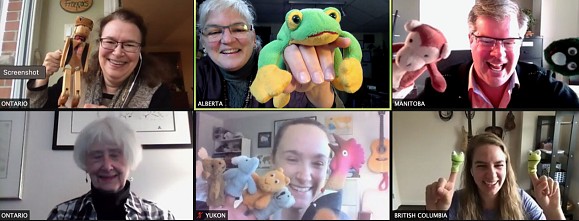 Forging Our Connections Coast to Coastby Karen-Michele Kimmett, Roblin (ON) The mandate of the Canadian e-Newsletter team has evolved dramatically since our last publication in June. We now have committee members hailing from British Columbia, the Yukon and Newfoundland. Our actions to date include the creation of the e-Newsletter website: www.canadiansuzukinewsletter.org and the creation of a committee to study DEIA (Diversity, Equity Inclusion and Accessibility) related issues from a Canadian perspective. A questionnaire has been developed for all Canadian Suzuki teachers with the goal of finding out more about who we are, what our unique challenges are and what articles might be pertinent in future issues. This fall, our team has held well attended meetings for Canadian Trainers and Institute Directors, as well as the first ever all Canadian Suzuki teacher Zoom meeting in October. We are excited for the possibilities that online SAA training courses offered by Canadian teacher trainers provide. The opportunity of online courses facilitates the possibility for Canadian Suzuki teachers—no matter their geographical location or instrument—to continue their training without the economic challenges that our great distances necessitate. This academic year a thriving Wilfrid Laurier University Suzuki Long Term Training program, directed by Paule Barsalou, includes teachers from Ontario to Brandon to Vancouver. Information about all the SAA training offered by Canadian trainers can be found both on our website and on the SAA website . Our Canadian e-Newsletter Steering Committee is dedicated to helping each of us stay informed while aspiring to deepen our knowledge about and connection to each other as Suzuki colleagues and leaders in our respective communities. We will need these Suzuki music connections and the hope they offer as COVID further entrenches hardship across our country. Dr. Suzuki’s reminder, timely as ever, says it all: ‘Where love is deep, much can be accomplished’ Canadian e-Newsletter Steering Committee: Katie Avery (YT) Paule Barsalou (ON), Carole Bestvater (NL), Erin Dorfer (BC), Karen-Michele Kimmett (ON), Gail Lange (ON), Nadia Petriw (BC), Rob Richardson (MB), Kathleen Schoen (AB) A new experience: online teacher development coursesby Gail Lange, Guelph (ON) From the onset of the pandemic, SAA began to question the impact on Suzuki teacher training courses for 2020. Teacher training offerings were halted as of March until September. This period did allow, however, for the process of revising and expanding of courses such as Every Child Can! and the new Unit 2 which will include Teaching Strategies, a practice teaching component to complete the program of teaching teachers how to teach children. What does online training mean for Canadian Suzuki teachers? What a golden opportunity for Canadian teachers spread out over our vast country! Online courses have no borders; there are no flight reservations or hotel bookings necessary. Just set up your computer near your instrument. Online courses bring Canadian teachers in contact with other teachers from all the Americas. And, if your course is taught by a Canadian trainer, you can probably pay in $CAD! We recognize that nothing can replace in-person contact between trainer and teacher participant. Nothing replaces the learning environment of the summer institute. However, online courses do offer participants positive experiences:
And many more. The role of the Canadian e-Newsletter website: www.canadiansuzukinewsletter.org
Therefore, fellow Canadian teachers—and trainers, what could you do at this moment? Consider what training course would be particularly valuable to you right now . Check the SAA listings: www.suzukiassociation.org/events/ AND the Canadian e-Newsletter website (see above) to see if that course is listed. If not, fill out the Teacher development form on the website to inform our Canadian trainers that you are interested in a particular course. Trainers need help, too! And, to my fellow trainers, please consider offering an online Unit course or an enrichment course in your instrument. Use our website to help publicize it. Canadian teachers and trainers: Do take advantage of this opportunity! 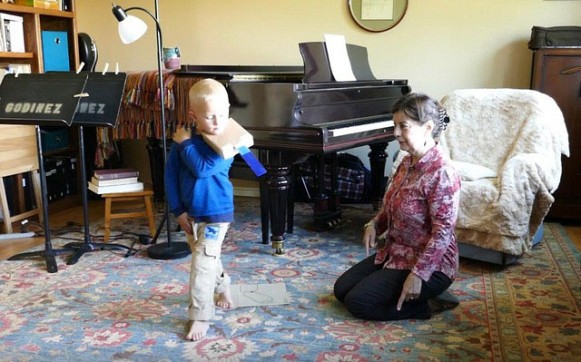 Starting Suzuki Beginners Onlineby Flory Godinez (Wynndel,BC) Covid-19 has forced all of us to make changes in how we teach. Many of us began teaching music lessons via Skype or Zoom. However, another innovative way we can provide instruction is by launching a website of prerecorded sequential video lessons. A few weeks into the pandemic, with help from my husband and son, we began creating an online Suzuki violin course to start students the way I learned in Japan via Denda-sensei’s ‘box’ method. I live near Creston, BC, a town of 5,000 and my studio is small. At the start of the pandemic I wondered, “Can something good come out of this situation? Is there a way to reach more students and introduce more families to the joy and fulfillment of a Suzuki education?” I’ve gone to YouTube many times to learn gardening skills. How about beginning Suzuki music lessons in a YouTube-like format? I’m fortunate that my husband spent a lifetime working with computers. We learned so much preparing to launch MapleNorthStrings.ca and hope that some of these ideas may be helpful to you. Watch some of the excellent, free YouTube videos on how to present yourself on camera. People are used to watching professional actors on television. Rather than being intimidated by that thought, there are simple things you can do to help the student focus on you and the lesson. Incorporate a variety of activities. Each of my online lessons includes several components drawn from sequential pedagogy, music reading, Suzuki philosophy, practice tips, encouragement and inspiration for the parent. If you are revamping your website, have a friend who is not a musician read your content. Can they understand it? As musicians, we have a specialized vocabulary which can be unintelligible to the non-musician. It’s easy for us to unwittingly use terminology that bewilders and intimidates the prospective Suzuki parent. On your website give only a brief professional bio. Rather, emphasize how the Suzuki lessons you offer can benefit the child, parent, and family. If you are going to make online videos, remember it is a skill just like performing on your instrument. It may take practice to get comfortable in front of the video camera. I have written scripts and practiced saying them out loud. Some words, without practice, I will pronounce incorrectly, or slur together. I purposely left some of my awkward moments in front of the camera on the early videos so that parents can see that I am also learning new skills. An article, reprinted in our Creston paper suggested that some things in our world may have changed forever. The example given, was that after the 9/11 attacks, airport security checks and screening became normal. For us, as musicians and teachers, what will become normal after this pandemic is over? Perhaps it will be normal to offer more internet music lessons in varying formats rather than primarily face-to-face lessons. 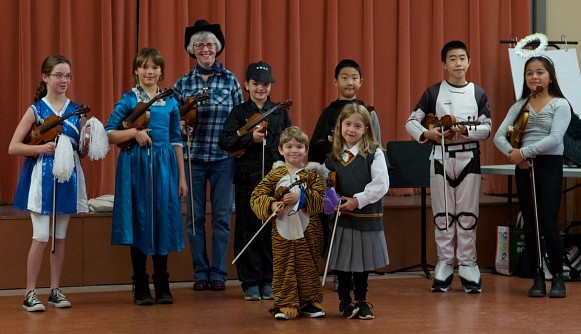 Hallowe’en Group Class, studio of Sue Irvine, Charlottetown, PEI. Our yearly traditions: a sound effects story, Gabby Ghost (B. Chase), and Witches’ Dance, with parent, sibling, and grandparent participation. Greetings from Charlottetown!by Sue Irvine, Charlottetown (PE) Greetings from Charlottetown, PEI! I have really enjoyed connecting with other Canadian Suzuki teachers on the Zoom meetings set up by the e-Newsletter committee. We are excited to hear about the possibilities of online teacher training. There is a very active string community on PEI, but at this point the cost of travel to institutes has kept teachers from starting or continuing their training. Currently we are able to teach in person with operational plans, and the three Singing Strings orchestras started rehearsing again at the end of September. I direct the Junior Singing Strings which this fall has 16 students aged 8-12, from 11 different schools, and 6 studios. The Intermediate and Senior orchestras are a little larger. Several violinists from the Singing Strings have recently completed music degrees, and there is definitely interest in Suzuki teacher training. 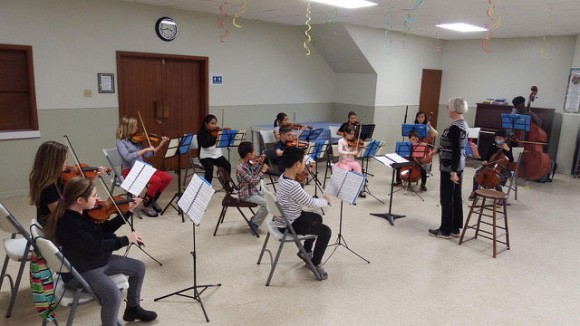 Junior Singing Strings November 4 presentation for parents. An Update from the Northby Katie Avery, Whitehorse (YT) 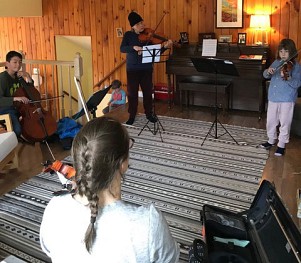 We’re lucky up here in the Yukon. Isolation is the norm for us, so the pandemic doesn’t feel like such a big change. We have restricted gatherings and we try to keep our space, but we aren’t under orders to wear masks in most circumstances. I’m able to teach most lessons in person, though I end up online sometimes when I or one of my students is ill. Group lessons are online because of gathering limitations and venues being unavailable. I have no plans for performances in the near future. I knew the year would look like this, so I decided to try something new. About half of my students are currently working on chamber music. Students in mid book 2 and beyond were invited to take part and be placed in a trio or quartet. Almost all of my eligible students leapt at the opportunity to take part. I have 3 trios and 2 quartets ranging in age from 8 to…well let’s just say senior. Some groups are all adults or teens and a few are a mix of ages. The photo is of one such mixed group at our last coaching session together. Groups get together once a week on their own and then once a month or so I come in and help them grow together as an ensemble. To be honest I expected this to be a much greater challenge for my students than it has turned out to be. None of them had any chamber music experience and most were extremely shy orchestral players. And yet all my groups are thriving. They are learning to breathe together, to listen more deeply, to lead and follow, and countless other things I’m sure. Here is a testimonial from one of my Adult students: I can’t wait to see where this all goes!  Canadian Suzuki DEIA CommitteeIntroducing the Canadian Suzuki DEIA* Committee By Kelly Williamson, Cambridge (ON) One of the cornerstones of the Suzuki philosophy is respect for all, including each person’s “life force”, an energy that is both individual and also intrinsically equal. In Canada, as in other countries, one of the many tasks we face is the responsibility to work towards a more just society. Dr. Suzuki gave us this challenge: “All people who love art should burn with the obligation to save the world.” We are forming a committee to create a statement for the e-Newsletter’s new website www.canadiansuzukinewsletter.org to express the Canadian Suzuki community’s commitment to inclusion and anti-racism, and to define the vision of our community as a place where all are welcome and have an equal opportunity to reach their highest potential. One of the group’s objectives is to collect resources for the use of our members, including teachers, parents and students. Our first step is to educate ourselves. Members of the committee are currently reading “21 Things You May Not Know About the Indian Act” by Bob Joseph, and “Heart Berries” by Terese Marie Mailhot. Previously reviewed materials include “Between the World and Me” by Ta-Nehisi Coates, “How to Be an Anti-Racist” by Ibram X. Kendi, and “So You Want to Talk About Race” by Ijeoma Oluo. The committee consists of David Evenchick, Rob Richardson, Rick Dorfer and Kelly Williamson. If this is work that you would like to be involved with, you are invited to join us by going to the Canadian Suzuki e-Newsletter website and signing up under the contact button. Please note that the board of the Suzuki Association of Ontario has been leading the way by posting an anti-racism statement and action plan on its website in June. The statement includes a resource list. Both can be accessed from the landing page at https://suzukiontario.org. A next step that the SAO Executive has planned is a session for the 2020-2021 SAO Board with consultant Marva Wisdom. This session will be held in advance of the strategic planning that it will resume next year, with the intention of sharing a common understanding regarding inclusion and systemic racism. A core goal is for diversity and equity awareness to permeate the vision and any actions that the board takes. *DEIA stands for Diversity, Equity, Inclusion and Accessibility Suzuki Repertoire As It Isby Sarah Westwick (Vancouver,BC) Dr. Suzuki encouraged teachers and parents to strive to give their children “noble hearts” through the study of music. I believe that in order to do this we must face the systemic sexism and racism that has plagued the classical music industry for centuries and rediscover the incredible, beautiful, and meaningful music that has been composed by women and visible minorities. For over 25 years I have been learning about performing, and teaching music by forgotten women composers—women from the 1600’s to the present who were phenomenal composers, but whose music was neglected because they were women. Recently I have realized that composers who were members of visible minorities faced the same discrimination, so I am working to educate myself about them so I can share their music with my students. The traditional canon of pieces that all violinists should learn was formed in societies that were sexist and racist. By sticking to and preserving this canon without exploring the possibility that there is music worth learning by female and Black composers, we are doing a disservice to our students. It would benefit all students to be able to learn music from a diversity of composers. There are three main reasons why we should supplement the Suzuki repertoire with music written by women and visible minorities:
I encourage all violin teachers to visit the following websites: Music by Black Composers (https://www.musicbyblackcomposers.org/) Violin Music By Women (https://www.violinmusicbywomen.com/) Hildegard Publishing Company (https://www.hildegard.com/) and to learn about Métis fiddling. I also recommend listening to music by Isabella Leonarda, Elizabeth Claude Jacquet de la Guerre, Joseph de Bologne, Louise Farrenc, Fanny Hensel, Clara Wieck Schumann, Amanda Rontgen Maier, Amy Beach, Samuel Coleridge-Taylor, Irene Poldowski, Dora Pejacevic, Florence Price, Germaine Tailleferre, and William Grant Still, as well as Métis fiddle music by John Arcand and Andy DeJarlis. These are just a few of my favourite composers for violin! Each year I organize one student recital dedicated to music by women composers, and this year we will be adding composers from other under-represented groups. It is always so wonderful to explore this music with my students and their families. 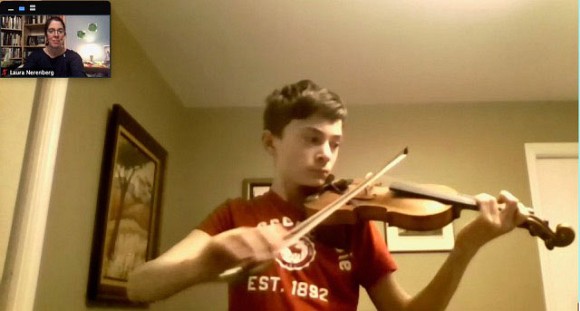 Jared Letts, 13, improvising using the Off the Page collection by Dr. Sera Smolen. He’s playing in the Japanese Sakura pentatonic scale in a zoom lesson with me. What is Creativity Training and Why does it Matter?by Laura Nerenberg, Ottawa (ON) In 2003, I started working with Dr. Sera Smolen, which irrevocably changed my outlook on teaching. Dr. Smolen is a pioneer of Creative Ability Development (CAD). Developed in the 1980s by Alice Kanack, CAD is a method that uses musical improvisation to nurture the creative side of the brain. Dr. Suzuki was delighted with Alice and nicknamed her Mozart’s Mother for her ground breaking work. Just as with Suzuki, CAD students learn using core principles:
These two core principles can be summed up in this equation: Freedom of Choice + Disciplined Practice = Development of Creative Ability Finally, I’d like to address the elephant in the virtual room. Only a small number of Suzuki teachers teach their students to improvise. Even though CAD has been around for decades, and its extraordinary results have been demonstrated at Suzuki events, very few Suzuki teachers have made it an integral part of their teaching. Unlike reading, group classes, supplementary repertoire and ensembles, CAD and improvisation are often seen as just for fun, or only for those who are already creative. How can we teach the Arts and not teach creativity? I think the answer is two-fold:
Why creativity training matters today Our world is more complex than ever in my living memory. By the time our students will have grown up, their world will be even more so. It is only through the combining of convergent (linear, step-by-step) and divergent (creative, out of the box) types of thinking, that today’s children will be equipped to handle tomorrow’s challenges. CAD provides the divergent thinking skillset that is lacking from most music instruction. If you are interested in learning more about CAD, including teacher-training opportunities, or observing one of my CAD classes, get in touch. I can be reached at junezaria@gmail.com Manitoba Teachers Hold First Zoom Meetingby Paul Madryga, Brandon (MB) It’s not hyperbole to say that the present COVID-19 situation has changed the way we do our work as teachers! This includes changing how we establish and nurture our professional relationships, as well. Current Canadian Suzuki initiatives, such as this e-Newsletter, certainly predate the current pandemic, yet we can—for want of a better word—credit it for giving these initiatives some additional impetus to quickly evolve. As such, a Manitoba contingent of Canadian Suzuki teachers held a meeting via Zoom for the first time, on the evening of Saturday, 7 November 2020. After introducing/re-introducing ourselves to our provincial colleagues, we expressed to one another how important opportunities like this are to stay connected, motivated, and creative in these unprecedented times – as meeting Chair Robert Richardson put it: “Seeing you all gives me inspiration.” Difficult times are often the catalyst for new collaborative ideas and innovative thinking: Rob shared with us the Brandon Suzuki program’s contribution to the SuperNova SuperString Spectacular video project, involving string students from programs across North America. The Brandon students’ contribution was an arrangement by David Cutler of Minuet 2 from Book 1. The full video aired live on the afternoon of 14 November, and remained available for viewing at https://www.savvymusician.com/superstring for one week. Also, along the lines of communication and connection, guest violin teacher-trainer Karen-Michele Kimmett mentioned that these were the SAA’s goals in the facilitation of the Canadian e-Newsletter project. We discussed the potential benefits of online teacher training, such as the cost-saving convenience of not having to travel to take training. It must be noted that this initiative is still taking its baby-steps: Karen pointed out that some of us are more at ease than others with the virtual teaching environment, where it’s difficult to have the whole-person experience of teaching a child (i.e., what a teacher might typically notice when the student walks in the door might be lost via a screen), and we have to find new ways to connect with the family. Other items of discussion followed:
This meeting was a reminder that our families rely on us more than ever to provide the positive energy of music-making in their lives – considering how diminished their ability may be to reciprocate that energy, we have to dig a little deeper and be a little more creative than usual. Fortunately, our online get-together also reminded us that we’re each a part of something far larger than ourselves, and there is no shortage of support – we’re all in this together! Paul Madryga, provincial representative on behalf of the Manitoba organizing committee (Krystena Krahn, Paul Madryga, Joanne Martin, Robert Richardson, Allison Warrian, & Marla Winters) Breathing New Life into a Well-Established Canadian Suzuki ProgramAn Interview with STEP Artistic Director, Valerie Hewson J: Valerie, I’ve watched you grow up in our Suzuki program here in St. John’s. I’ve watched you bloom from a student to colleague and now to Artistic Director of STEP. I’m fascinated to hear about some of these transitions. What would you say has been your biggest challenge since becoming STEP’s Artistic Director? V: I found that balancing the needs of and communicating well with all parts of the Suzuki triangle, while staying true to myself, has been my biggest challenge. J: Since you became A.D., many new changes have been introduced that have modernized and improved our program. What is one example of an important change and why did you feel it was necessary? V: When you take up leadership in any well-established organization, you come up against “the way we’ve always done it” issue. I realized that there were some structural changes that could improve our program but I had to introduce changes that wouldn’t entirely turn the whole program on its head. For instance, during the 37-year life of the program, we had always scheduled our group classes around the availability of the venue. I could see that the resulting inconsistency in the group class schedule was tough on families, students and teachers. I wanted to respect our families’ need for consistency so we found other venues that could accommodate a more effective and consistent schedule. J: When the pandemic swept the planet in the spring, STEP managed to continue instruction online. How did this happen? V: Knowing that music brings light into the darkest of times, I felt it was hugely important to continue, especially as so much structure dropped out of our students’ lives. It took many 13-hour workdays researching online platforms and ideas from other programs, but within a week’s time, we were up and running online. We introduced many new classes that lent themselves to online learning such as an improv class, a composer’s class, a Body Mapping class and new ways to approach sight-reading online. J: Then when it came time to make a decision about whether our summer Suzuki camp would take place, you already knew that this could work! V: Yes, we couldn’t run an SAA approved institute but as a stop-gap measure until the pandemic was over, we could offer similar musical experiences for families and teachers, but virtually. Because we went virtual, new families were able to join us from all over North America, families that would not have normally made the long trip out to Newfoundland! J: Finally Val, I’m wondering what you think has contributed to STEP’s longevity as a Suzuki program in Canada. V: Even though we’re a small program, we’ve always had amazing dedication from our teachers and parents alike and I think that our strong sense of community as Newfoundlanders provides an excellent backdrop for the kind of community that Dr. Suzuki envisioned for his philosophy to thrive in. News from the Suzuki Association of Ontario!On Sunday, November 15, the Suzuki Association of Ontario hosted the first online AGM in our history. While it was wonderful to reconnect with Suzuki teachers in our province, it was bittersweet for those who enjoy the yearly workshop day that usually accompanies this meeting. The SAO Annual Conference, which was to take place in Kingston, has been postponed until November 2021. We are hopeful that we will be able to gather together next year. In the absence of our conference, the SAO Board is looking for new ways to engage with members and with the Suzuki community. This summer, we hosted “COVID Information Night with Meghan Smith, RN”. The event was well attended, and extremely informative. This was the first online event the SAO had ever hosted. Starting in February, we will be offering a series of online mini events for all Suzuki teachers. Each session will feature a different guest speaker on a variety of topics including diversity, equity and inclusion, and much more! To encourage as many people to attend as possible, each event will be pay-as-you-can. More details about upcoming sessions can be found on the SAO website: www.suzukiontario.org If you are looking for ways to be more connected to the Suzuki community in Ontario, consider joining our mailing list with subscribing membership. If you would like to join us as an active member, check out the perks! Here are a few things we offer our membership:
You can read more about membership here: |
||||
|
You received this message because you are a member or supporter of the Suzuki Association of the Americas. Suzuki Association of the Americas |
||||